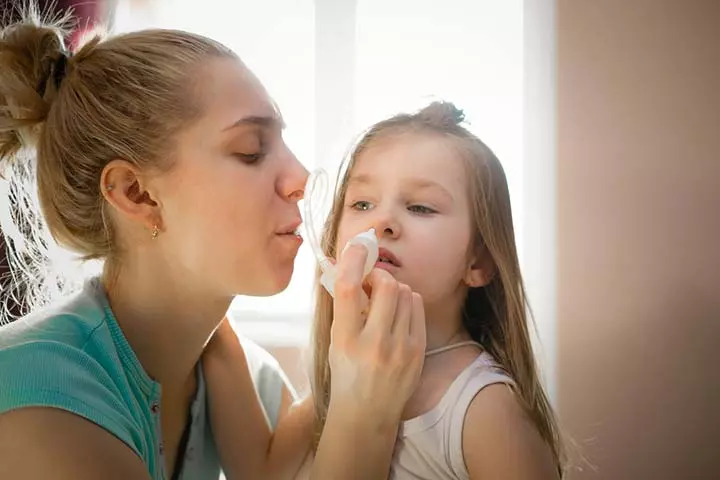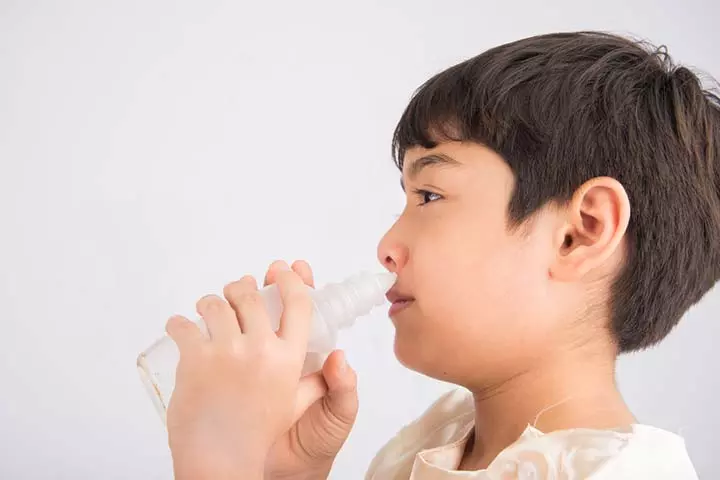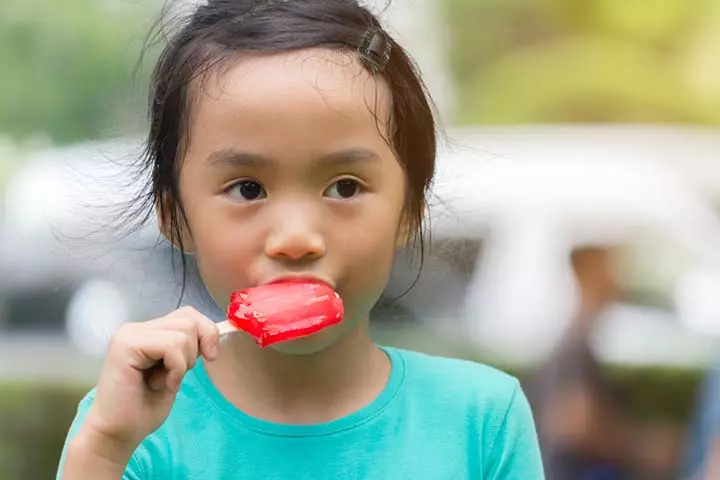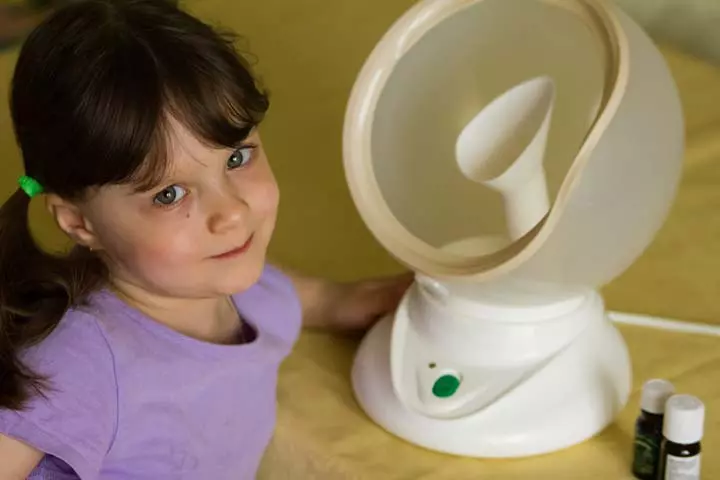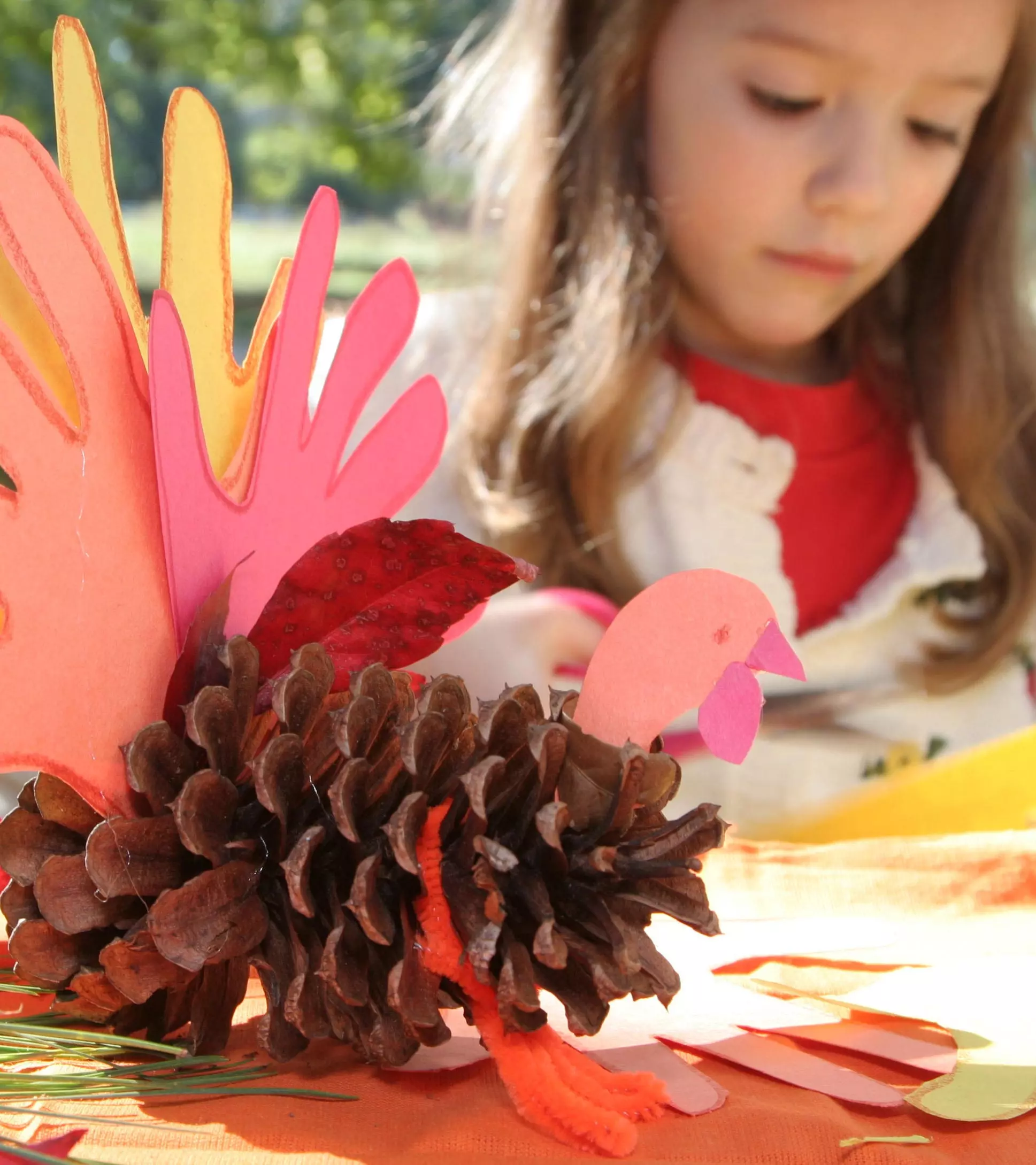

Image: Shutterstock
Cough in kids can be due to infectious or noninfectious causes. Experts suggest that if a child has a cough but is otherwise healthy, you shouldn’t try to suppress it. Instead, let it take its course. Coughing is an airway defense mechanism. It is a reflex that triggers the airways to expel inhaled irritants and excess mucus, which is necessary to maintain respiratory health (1) (2).

However, you can ease your child’s discomfort by trying some simple cough remedies for kids shared in this post. These home remedies are simple, child-safe, and may help reduce symptoms, such as sore throat, that often accompany the cough. But before we know them, let’s get a brief insight into different cough types.
Different Types Of Cough
Cough is usually classified into two types (3).
- Dry cough: It commonly occurs due to the irritation of the upper airways — the sinuses, throat, and vocal cords. This irritation is often caused by viral infections or allergies that cause a tickly throat but no phlegm or mucus (4).
- Wet cough: In contrast to dry cough, the wet cough usually occurs due to the irritation of the lower airways that cause the production of mucus, which comes up while coughing (4).
Some common causes of cough in children include croup, whooping cough, and bronchiolitis (5). Irrespective of the type of cough, your doctor may suggest home remedies, like the ones shared below, to provide relief to your child.
Simple Cough Remedies For Children
Pediatricians advise against cough and cold medicines for children younger than six years since they may cause more harm than good. Especially when starting day care, the infection follows one another and successive flu seems to be the same disease.The cough caused by the infection usually lasts for 1 to 2 weeks. Thus, you may consider the following simple and safe home remedies for cough for children of all ages after consultation with your child’s pediatrician.
1. Rest
Proper rest and optimum hydration can help most children feel comfortable during an episode of cough and cold. Ensure your child takes plenty of rest with their head raised using a pillow. It’s essential as lying flat causes mucus build-up in the sinuses, clogging nasal passages (2). Clogged nasal passages make breathing difficult and disturb sleep. Besides, lying flat causes a post-nasal drip, which intensifies cough. Thus, you can use pillows for children above one year to keep their heads raised while they rest peacefully.
2. Massage
Image: Shutterstock
A persistent cough can cause the neck, chest, and upper back muscles to ache and stiffen. A massage can help ease this added discomfort. You may consult a professional therapist and learn some good massage techniques to help alleviate muscle soreness due to cough in children.
3. Hydration
Cough can affect your child’s food and fluid intake, which can cause dehydration. Make sure your child drinks plenty of fluid, such as warm water, lemon water, or soup. Additionally, you can consult your doctor about certain teas, such as chamomile tea, which children can have to soothe a sore throat, fight infection and inflammation, and loosen mucus. Experts suggest that proper hydration “may help loosen mucus and soothe an irritated throat (6).”
4. Hot shower
Image: Shutterstock
Breathing steam is a common home remedy to relieve dry cough. Inhaling steam may loosen mucus and ease congestion, making blowing the nose easier. Usually, steam inhalation involves sitting with your head over a bowl of hot water covered with a towel. However, this steam inhalation method isn’t advisable for children due to the scalding risk. Hence, pediatricians suggest children sit/stand in a hot, steamy bathroom for ten minutes (2).
If your child has a croup-like cough, put them into cold air after the steam. According to Dr. Pamela Phillips, “one to two punches of steam followed by cold air tends to quiet down the cough.”
5. Humidifiers
Image: Shutterstock
Dry air dries up the mucus and clogs the airways, causing congestion. Thus, if the air in your home is dry, use a vaporizer or cool-mist humidifier. A cool-mist humidifier disperses moisture into the air, loosening the mucus and relieving sore throat. Since the humidifier makes the area closest to it moistest, keep it close to your child. After using it for a stipulated time, discard the used water and thoroughly clean it to prevent bacteria or mold growth.
Don’t use warm-mist humidifiers as they can cause the nasal passages to swell, making breathing laborious (7).
6. Nasal suctioning
Image: Shutterstock
If the child has a runny nose with a cough, clearing their nasal passage by blowing their nose can ease breathing. However, young children may be unable to blow their nose. In such cases, parents can use a suction bulb, bulb syringe, or nasal aspirator to suck out the excess mucus (8). But, before using a nasal bulb or aspirator, get trained on the steps to use them appropriately. Here are the simple steps you could follow.
- Put the child in the sitting position. Take a suction bulb and squeeze it. While holding it like that, put the suction bulb nozzle inside one of the child’s nostrils, and gently release it.
- Bring the suction bulb out of the nose and clean it using a clean cloth. Rinse the bulb with clean water before using it again.
7. Nasal saline drops
Image: Shutterstock
If a bulb syringe doesn’t work, saline drops can help loosen the mucus and prevent sinus infection and post-nasal drip (8). Besides, it keeps the mucous membrane moist. You can buy an over-the-counter (OTC) pediatric nasal saline drop and use it as per the directions on the label or your doctor’s guidance.
Alternatively, you can make your saline nasal drops by mixing half a teaspoon of table salt into a cup of warm water and then storing it in a clean, covered bottle. Here’s how to use the drops.
- Put two to three drops of the saline in the opening of each nostril, one side at a time.
- Ask your child to blow their nose or use a bulb syringe to suck out the mucus.
Experts recommend children do nasal washes whenever they can’t breathe through the nose comfortably (8).
8. Gargling
Image: Shutterstock
Gargling can soothe a sore throat and ease coughing. You may encourage the child to gargle with saltwater. You can dissolve a teaspoon of salt in a glass (250ml) of warm water and use it for gargling. You can demonstrate to older children the right way to gargle and then let them do it a few times during the day. Gargling, especially before bedtime, can relieve nasal congestion and throat irritation, reducing cough and helping children sleep better.
9. Pediatric vapor rubs
Image: Shutterstock
Pediatricians advise that parents shouldn’t use camphor-containing products, such as vapor rubs, for children under two years. However, you can consult your pediatrician and use a mentholated vapor rub for older children. You can apply a small amount of it on the child’s nose, neck, chest, and back. According to experts, these rubs give a cooling sensation and improve the air movement in the nostrils, making children believe that they can breathe better. It can also relieve throat irritation due to cough, helping the child sleep comfortably (9) (10).
10. Honey
Image: Shutterstock
Honey is a natural sweetener that possesses antimicrobial and antioxidant properties. Children older than one year can consume honey to relieve sore throat and fight infections. You can mix a teaspoon of honey and some lemon in a cup of warm water and feed it to your child before bedtime. Experts share that honey is more effective in reducing nighttime coughing than cough syrups (11).
11. Ginger
Image: Shutterstock
Ginger is a common cough remedy in Ayurveda. Research shows that ginger contains certain bioactive compounds, which possess broncho-relaxant properties (12). It means that ginger intake may help airways relax and open. Traditional literature suggests the following ways to consume ginger for relieving sore throat, persistent coughing, and congestion (13).
- Boil crushed fresh ginger in water and drink the resulting concoction three to four times a day
- Cut a piece of fresh ginger and sprinkle some salt on it and give it to your child to chew for a few minutes.
However, not all children like chewing ginger. For them, you can boil a few small ginger pieces in a cup of water until its volume reduces to half the original amount. Then, strain the liquid, add a teaspoon of honey, and feed it to your child.
12. Turmeric milk
Image: Shutterstock
Turmeric is known to have therapeutic effects on dry cough. Here are some ways to feed turmeric to your child for cough relief (13).
- Mix a teaspoon of turmeric and black pepper in half a cup of water. Boil and feed the concoction to your child daily until the cough subsides. You may also add a teaspoon of honey and cinnamon stick to this drink.
- Mix a teaspoon of turmeric powder and carom seeds in a cup of water, and boil the mixture until the water reduces to half. Add some honey and feed this drink to your child two to three times a day.
- Mix a teaspoon of turmeric powder into a cup of hot milk and feed it to your child to relieve cough.
13. Popsicle
Image: Shutterstock
The Centers for Disease Control and Prevention (CDC) advise children to suck on cold items, such as ice chips or popsicles, to soothe scratchy throats (14). This remedy is most beneficial in cases where the child has a sore throat due to a dry cough.
14. Essential oils (EOs)
Image: Shutterstock
Peppermint, eucalyptus, anise, and tea tree are some EOs known to treat lower and upper respiratory infections that cause cough (15). One can appropriately dilute these oils and use them for diffusion or topical application purposes. However, consult an aromatherapy expert before choosing and using a specific essential oil for your child.
15. Cleanliness and hygiene
Maintaining personal hygiene is essential to prevent viral and bacterial infections. Teach your child to adhere to optimum hygiene practices, such as:
- Changing clothes and bed covers daily.
- Coughing or sneezing with their mouth covered.
- Using tissue papers for blowing nose and discarding them immediately after use.
- Washing their hands after coughing and sneezing with soap and water, or sanitizer.
16. Cough drops
If a child is older than six years has a persistent cough, you can consult a doctor and use cough drops. Cough drops at bedtime can temporarily relieve dry, itchy, sore throat and help children sleep peacefully. If drops aren’t available, you can buy lozenges (cough candies). Lozenges also contain ingredients that soothe sore throats. Avoid giving them to children younger than four years since they pose a choking hazard.
When To See A Doctor
Most children recover from cough and common cold without medical intervention. However, you need to see your doctor if your child has one or more of the following signs and symptoms (16).
- Persistent cough, a cough that lasts for more than three weeks
- Difficult or labored breathing
- Intense coughing with rapid breathing
- Barking cough, like the sound of a seal, indicating croup, which can be dangerous to young children
- High fever with a cough but no runny or stuffy nose
- Dizziness or drowsiness
- Dry mouth, sunken eyes, or urinating less often
- If there is a suspicion of otitis media, difficulty breathing or pneumonia, you should start treatment
Frequently Asked Questions
1. When should I worry about my child’s cough?
Look out for these signs of concern when your child has a cough (16):
- The cough persists for more than four weeks
- The cough is accompanied by fever, rapid breathing, and dehydration
- Inability to speak because of coughing
2. What kind of cough accompanies COVID-19?
The COVID-19 cough is described as a persistent coughing episode that can continue for more than an hour with three or more episodes in 24 hours (17).
Cough in kids is usually caused by an upper or lower respiratory tract infection. Since cough may take some time to resolve, it is advisable to let nature take its course, aided by plenty of rest, hydration, and gargling with salt water. Refrain from giving any OTC cough syrups or drops to children, especially those under six. Instead, for children above two, you can use pediatric vapor rubs. In addition, consult your doctor to learn about some safe home remedies to help your child feel comfortable and sleep easily.
Key Pointers
- Dry and wet cough are the two types of cough in children.
- You must consider seeking medical help if the cough stays for three weeks, along with breathing difficulty, high fever, dryness, and dizziness.
- Some effective remedies include rest, massage, hydration, hot water bath, and humidifiers.
- Cough drops, essential oils, turmeric milk, ginger, and gargling could also help relieve the cough in children.
References
- Why Does My Child Have a Chronic Cough?
https://www.healthychildren.org/English/health-issues/conditions/chest-lungs/Pages/Why-Does-My-Child-Have-a-Chronic-Cough.aspx - Child\’s Cough: Is No Medicine the Best Medicine?
https://www.cedars-sinai.org/blog/best-medicine-childs-cough.html - Types of Coughs in Children.
https://www.childrenscolorado.org/just-ask-childrens/articles/types-of-coughs/ - When a cough may be more than just a cough.
https://www.osfhealthcare.org/blog/a-cough-may-be-more-than-just-a-cough/ - Cough.
https://www.nhsinform.scot/illnesses-and-conditions/lungs-and-airways/cough - Relieving A Cough.
https://www.uofmhealth.org/health-library/ug1887 - Should You Give Kids Medicine for Coughs and Colds?
https://www.fda.gov/consumers/consumer-updates/should-you-give-kids-medicine-coughs-and-colds - Coughs and Colds: Medicines or Home Remedies?
https://www.healthychildren.org/English/health-issues/conditions/chest-lungs/Pages/Coughs-and-Colds-Medicines-or-Home-Remedies.aspx - 5 home remedies worth trying.
https://childrensmd.org/uncategorized/5-home-remedies-worth-trying/ - Evidence for Vicks VapoRub?
https://seattlemamadoc.seattlechildrens.org/evidence-for-vicks-vaporrub/ - Coughs: Meds or Home Remedies?
https://www.seattlechildrens.org/conditions/a-z/coughs-meds-or-home-remedies/ - Elizabeth A. Townsend et al.; (2013); Effects of Ginger and Its Constituents on Airway Smooth Muscle Relaxation and Calcium Regulation.
https://www.ncbi.nlm.nih.gov/pmc/articles/PMC3604064/ - Shahnaz Sultana et al.; (2016); Cough Suppressant Herbal Drugs: A Review.
http://www.ijpsi.org/Papers/Vol5(5)/D0505015028.pdf - Sore Throat.
https://www.cdc.gov/antibiotic-use/sore-throat.html - Györgyi Horváth and Kamilla Ács; (2015); Essential oils in the treatment of respiratory tract diseases highlighting their role in bacterial infections and their anti‐inflammatory action: a review.
https://www.ncbi.nlm.nih.gov/pmc/articles/PMC7163989/#ffj3252-note-0050 - Key Coughs Parents Should Know.
https://www.choa.org/parent-resources/everyday-illnesses/common-kids-coughs-explained - Coronavirus (COVID 19) symptoms in adults.
https://www.nhs.uk/conditions/covid-19/covid-19-symptoms-and-what-to-do/
Community Experiences
Join the conversation and become a part of our nurturing community! Share your stories, experiences, and insights to connect with fellow parents.
Read full bio of Dr. Salla Semmane
Read full bio of Swati Patwal




